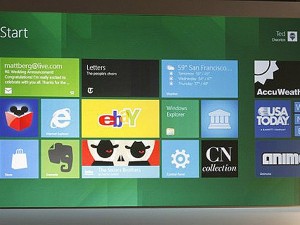
Microsoft introduces a new app store for Windows during the Windows Store preview event in San Francisco on December 6, 2011 in California. AFP/KIMIHIRO HOSHINO
SAN FRANCISCO – Microsoft on Tuesday began wooing developers for a February opening of its first “app store” for computers powered by the US technology giant’s Windows software.
The Windows Store will open in late February when Microsoft releases a test version of its next-generation Windows 8 operating system.
It will take on Apple and Google in the booming market of fun, hip or functional programs built for smartphones, tablets, or computers.
“I think we are going to do great,” Windows Web Services vice president Antoine Leblond said as he gave developers and press a preview of the store in a San Francisco art gallery.
“The reach of Windows is absolutely huge and can’t be matched,” he continued, noting that the Microsoft operating system powers more than a half billion computers around the world.
Independent developers understandably devote their limited resources to making programs for platforms that promise the most potential customers, and Windows would outshine Apple gadgets and Google Android devices in that regard.
“There are more Windows PCs [personal computers] than there are cars on the planet,” Leblond said. “The number is staggering.”
However, Windows has a meager presence when it comes to smartphones and tablets, where third-party applications such as games are typically bought.
Applications written for the Windows Store platform will work on any devices powered by the Microsoft software, meaning programs could be downloaded to smartphones or tablet computers as they hit market.
Microsoft declined to discuss reports that tablets based on Windows 8 are in development.
Windows Store was pitched as a welcoming option to Apple App Store, which puts applications through a strict and sometimes enigmatic vetting process before approving them for virtual shelves.
“Today, one of the most frustrating things for building apps are the constraints on way you can do and what you can sell,” Leblond said.
Apple requires applications for iOS devices to conduct financial transactions such as subscriptions or sales in-house, with the iPhone, iPad, iPod, and Macintosh computer maker taking 30 percent of the revenue.
Windows Store platform will have mechanisms for in-app purchases, but developers will be free to choose methods of handling financial transactions, according to Leblond. “Developers create apps to put in Apple’s App Store only to have Apple stand between them and the customer while taking 30 percent,” he added.
“We won’t get in the way of your app and your business model,” Leblond said.
Microsoft demonstrated Windows applications from the renowned British newspaper The Daily Telegraph and from online auction titan eBay that handled payments or subscriptions with their own tools.
“That is not an app you could have on the iPad,” Leblond said, referring to the Daily Telegraph program. “Apple would sit between them and their subscribers and take a 30 percent cut; we won’t do that.”
Windows Store will let developers set their own prices for applications in a range from $1.49 to $999.99 “because a thousand bucks is just too much for an app,” he added.
The virtual shop will also support free applications that make their money from advertising.
Microsoft will take 30 percent of the revenue from application sales. After selling $25,000 worth of an application, the developers share climbs to 80 percent. Developers get to keep all the money from in-application transactions.
Leblond calculated that recovering the $50,000 cost of developing a typical small application would require .01 percent of Windows computer owners buying the software.
“That is nothing,” he said. “That is easily done.”
Windows Store will feature only free applications when it opens in February. Information for developers was available online at dev.windows.com.